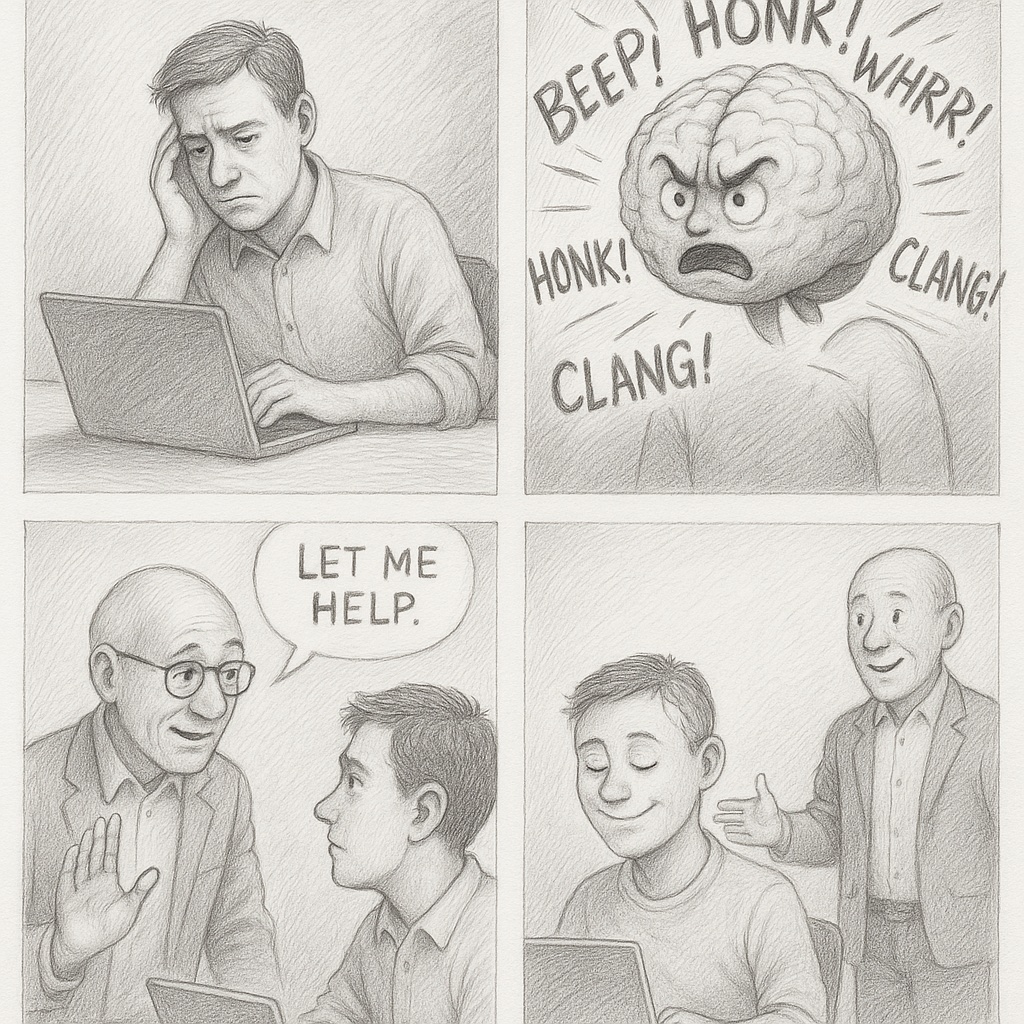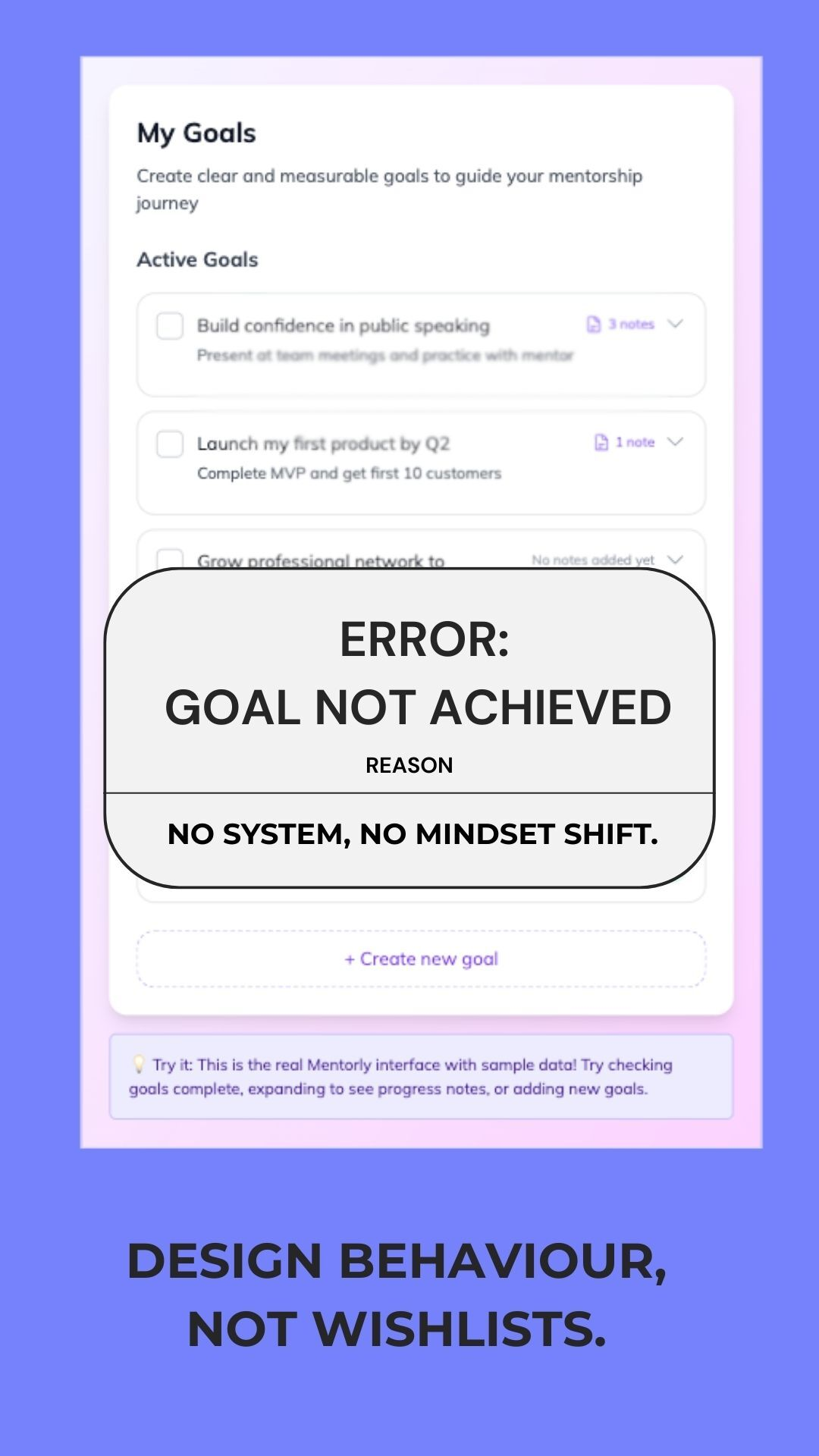Emotion vs. Execution: How Mentors Help You Decide With Your Prefrontal Cortex, Not Your Amygdala
Every founder, operator, or emerging leader has been there - the adrenaline spike of a bad Slack message, the career-defining email you shouldn't reply to (but did). This is your amygdala in the driver's seat.

Every founder, operator, or emerging leader has been there: the adrenaline spike of a bad Slack message, the career-defining email you shouldn't reply to (but did), the promotion denied, the colleague promoted. A simmering mix of disappointment, defensiveness, and doubt takes over. You pace. You replay. You spiral.
This is your amygdala in the driver's seat – emotional reasoning running wild with little input from your prefrontal cortex, the brain's executive center for logic, consequence mapping, and long-term planning.
Now, imagine what happens when you have a mentor.
A real mentor doesn't just nod empathetically and send you on your way with a motivational quote. They act as your cognitive fail-safe, a grounding presence that prevents your emotional center from making executive decisions. They help you make sense of the moment, without being consumed by it.
This isn't just a feel-good narrative. It's neuroscience.
Mentorship Is a Shortcut to Executive Function
The human brain is a wildly complex decision-making machine that defaults to emotional responses under stress. The amygdala, part of the limbic system, lights up when it perceives threat (which could mean anything from a layoff to a cryptic email). In high-stakes environments like work, the brain isn't great at distinguishing "This is a mortal threat" from "This is career feedback."
The prefrontal cortex, however, is where critical thinking, abstraction, and long-term goal setting live. It's slower, quieter, and often drowned out when you're triggered.
You can't access both at once. When the amygdala is overactive, it dampens the PFC. This is known as amygdala hijack (coined by Daniel Goleman in his work on Emotional Intelligence). And this is exactly where mentors come in.
A mentor doesn't just give advice – they calm the system.
Mentors Aren't Therapists, They're Realists with Pattern Recognition
Good mentors don't let you wallow in the swirl of emotion. They pull you out with questions like:
- "What exactly happened?"
- "What are the facts here?"
- "What have you already tried?"
They push you from narrative to analysis, from interpretation to observation. Their job isn't to validate your feelings, it's to make sure you're not making a $50,000 mistake based on a 3-minute Slack interaction.
They reflect back what they see, not just what you feel.
What's most effective about this process is that mentors have pattern-matched these kinds of experiences before. They've had the toxic boss, the chaotic reorg, the failed pitch, the co-founder tension. And because they're not in it, they can assess your reality without the narrative inflation that happens inside the emotional self.
Their calm, experienced nervous system models what it looks like to not take things personally.
Why Emotional Distance Equals Better Decisions
In 2016, neuroscientists from the University of Oxford published a study demonstrating that people make more rational choices for others than for themselves. Known as the Solomon's Paradox, the study showed that when people advised others, they showed more wisdom, perspective-taking, and probabilistic thinking than when making decisions for themselves.
Mentors essentially turn your internal problem into someone else's problem – with you still reaping the benefits of clarity.
The process looks something like this:
- You externalize the emotional swirl
- They deconstruct it to isolate facts
- They mirror back where your thinking is sound versus reactive
- They introduce data points from their own lived experience
- Together, you identify a forward-looking action that isn't reactive, but rational
It's a cognitive offload that lets you pause your internal chaos and download a more calibrated lens.
What This Looks Like in Real Life
-
You think you're getting edged out of a promotion – Mentor shares a story where they thought the same and were wrong. You investigate instead of rage-quitting.
-
You want to confront your boss in the next meeting – Mentor helps you realize your real goal is influence, not venting. You pivot to a 1:1 strategy.
-
You think you failed a stakeholder presentation – Mentor helps you decode their body language as confusion, not rejection. You follow up with clarity instead of retreating.
You don't just make better decisions. You become the kind of person who knows how to make them.
A Systemic View: Mentorship as a Rationality Engine
Too often, workplaces expect managers to provide emotional regulation for their teams. This leads to burnout, blurred boundaries, and dependency loops. What mentorship offers – especially structured, external mentorship like what we build at Mentorly – is a system-level upgrade to decision-making hygiene.
Mentorship separates the relational from the operational, giving people the space to process without performance pressure. And as more companies wake up to the cost of emotionally driven decision-making (attrition, burnout, toxic cultures), structured mentorship becomes not a perk, but a performance system.
The Future of Work Needs Rational Thinking. Mentorship Delivers That
We are living in a time when decisions are faster, stakes are higher, and emotions run hotter. If we want more grounded, rational, and resilient teams, we need to design environments where people aren't making decisions from their amygdala.
Mentorship is one of the last un-commoditized tools in the workplace that taps into wisdom, pattern recognition, and calm. It's not just about support, it's about better thinking.
Because if your goal is to win, to build, to lead, you don't need more feelings about your problem.
You need someone who's been through it and can help you see it for what it really is.
Want to experience what it's like to build your career with clarity instead of chaos?
Learn more about Mentorly's corporate mentorship programs: mentorly.com

